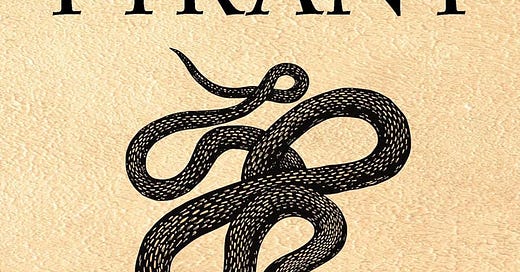With Tyrant, the second installment of his Nero Trilogy, Conn Iggulden deepens and surpasses the story he began in Nero. Where the first volume established the political machinery of Agrippina's Rome, this one throws open the gates, letting ambition, fear, and brutality surge through with even greater force. It is a novel of expansion, thematically and emotionally, and one that never loses control of its pacing or purpose.
While Agrippina remains a magnetic presence, Tyrant marks a clear shift in focus toward Nero himself. No longer just the heir-in-training, Nero begins to act, first tentatively, then decisively, in ways that reshape the court around him. The novel is interested in that moment when tutelage gives way to self-assertion, when power is no longer borrowed but claimed. It's a transition handled with remarkable subtlety. Nero is not yet the monster of legend, but we see the architecture of that myth being built one impulsive decision, one betrayed mentor, one broken bond at a time.
The historical sweep is considerable, yet Iggulden's touch remains precise. His Rome is a system with teeth, an empire that devours its own even as it dazzles. Iggulden carefully threads real historical figures and events through the narrative, never letting research overwhelm the story. For example, Iggulden uses a courtroom trial over a banned religious cult as a dramatization of early Christian persecution. It studies how ideology, law, and performance intersect under imperial rule.
The naumachia, a staged sea battle, is among the novel's most memorable sequences—not because of spectacle alone, but because Iggulden uses it to reveal character under pressure. The appearance of Caractacus, a defeated king forced to fight for Roman entertainment, offers a counterpoint to Nero's ascent: one man tested through humiliation, another through unchecked authority. It articulates broader themes like what Rome demands from the conquered, what dignity can survive under the imperial gaze, and how theater and power often converge.
What sets Tyrant apart from its predecessor is its broader scale and its acceleration. The narrative doesn't pause to admire itself. Instead, it ratchets tension with each chapter, moving from political intrigue to deadly spectacle with an urgency that feels earned, not manufactured. Tyrant is a novel that understands how to move history forward without dragging characters behind it.
Iggulden's prose remains lean and effective, never ornamental but never perfunctory. He writes with clarity and control, allowing the emotional and moral stakes to surface through action rather than exposition. The quiet horror of political pragmatism, the slow erosion of loyalties, and the calculated performances of power are rendered with the kind of narrative discipline that rewards attentive readers.
Tyrant is not a mere bridge between books. It builds on the foundation of Nero, but it also stands as the stronger novel, bolder in scope, more unrelenting in pace, and clearer in its moral questions. In Iggulden's hands, Rome is not romanticized but laid bare: a machine that rewards audacity and punishes hesitation. Tyrant is historical fiction with a pulse and a purpose.
This review is based on an advance reader copy provided by Edelweiss and Pegasus Books. Tyrant is scheduled for release in the USA on May 27, 2025, and in the UK on May 22, 2025, by Penguin.



